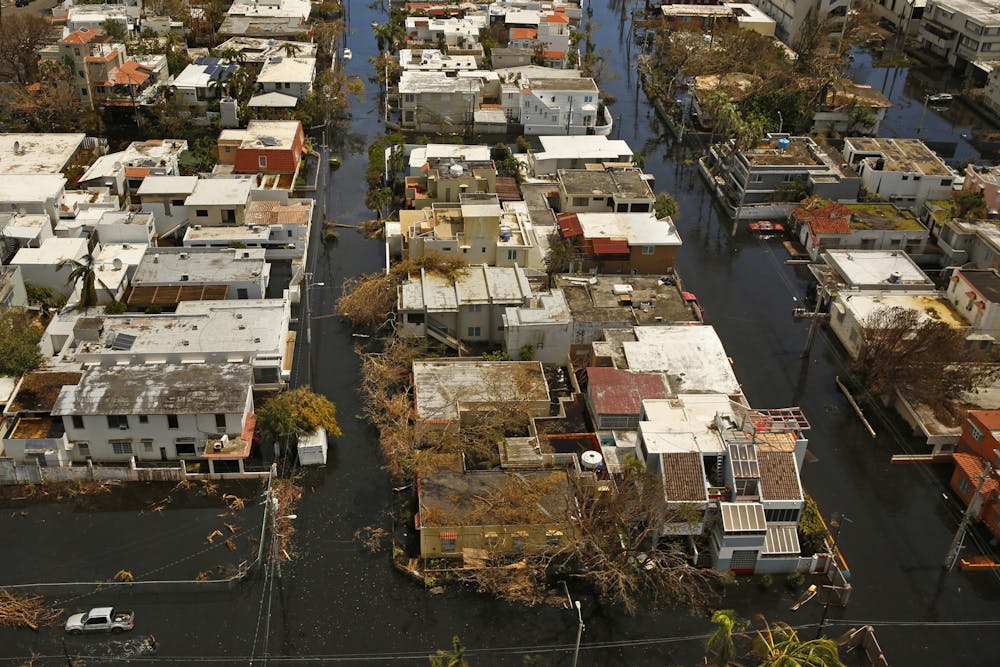Today, 3.6 million tax-paying Americans are without the right to vote, lack meaningful representation in Congress and receive little recognition from their government or compatriots. These American citizens constitute the United States’ far-reaching overseas territories, namely Puerto Rico, Guam, American Samoa, the U.S. Virgin Islands and the Northern Mariana Islands.
It is unconscionable that the U.S. maintains these territories as relics of its own imperialism and actively treats their inhabitants as second-class citizens. All U.S. territories must be granted either independence or statehood, in accordance with the desires of the territory. To do otherwise is to continue to betray America’s founding principles of equality and justice for all.
U.S. expansionism began almost immediately as our country brutally removed, assimilated or killed any Native American in its path westward.
Once the country could sing “from sea to shining sea,” it began to look past its own coastlines. In the dwindling Spanish Empire in the Caribbean and Pacific, American imperialists saw an opportunity. Under President McKinley, they seized it and declared war on Spain, invading Puerto Rico, Cuba and eventually the Philippines.
By the end of the Spanish-American War in 1899, Puerto Rico, Guam, the Philippines, Hawaii and briefly Cuba were all U.S. possessions. Under the following two presidents, Theodore Roosevelt and William Howard Taft, U.S. imperialism continued its march outward and its brutal repression of independence movements in already-acquired territories.
Anti-imperialist sentiment in the U.S. was buoyed by African Americans, labor opposition and writers such as W.E.B. Du Bois and Mark Twain. However, they could not halt its progress.
“It is a sorry, though true, fact that whatever this government controls, injustice to dark races prevails,” Lewis H. Douglass said in his 1899 essay “Black Opposition to McKinley.” “The people of Cuba, Porto Rico, Hawaii and Manila know it well as do the wronged Indian and outraged black man in the United States.”
In 1900, Germany and the U.S. agreed to split Samoa between themselves. Today, the German half is independent Samoa, while the other remains American Samoa. The U.S. purchased the Virgin Islands from Denmark in 1917, and it conquered the Northern Mariana Islands during World War II, recognizing them as a territory in 1986.
The imperial ambitions of late-19th and early-20th century America reverberates in very concrete ways with the millions still under territorial status today.
With the exception of American Samoa, those born in territories are granted U.S. citizenship. In direct contradiction to the 14th Amendment, however, they cannot vote in presidential elections, are each only allowed one non-voting member in the House of Representatives and completely lack any representation in the Senate.
Meanwhile, Wyoming, Vermont, Alaska and North Dakota elect eight senators altogether, despite having a combined population of half a million less than Puerto Rico’s. Aside from Vermont, each of these states claimed territorial status at one point in their history as well.
The devastation inflicted on Puerto Rico and the U.S. Virgin Islands by Hurricanes Maria and Irma in 2017 was a tragedy in itself. The U.S. government’s response, though, was criminally cynical and highlighted the deep-seated apathy it holds towards its territorial citizens.
“I think that Puerto Rico was an incredible, unsung success,” President Donald Trump said after nearly 3,000 Puerto Ricans died on his watch during Hurricane Maria.
Compared to the work done in Florida and Texas, also affected by the hurricanes, recovery in the territories has been slow and relatively ineffectual. It took Congress nearly two years after the hurricanes to release federal aid to the islands. Additionally, the Federal Emergency Management Agency has funded only 190 projects in Puerto Rico and 218 in the U.S. Virgin Islands, while allocating funds for 3,700 projects in both Florida and Texas.
It is difficult to view these policies as anything but a belief that the government has no obligation to the welfare of its territorial citizens; rather, it acts as though the territories are privileged to receive any assistance from their benevolent occupiers. Never mind the fact that the federal government’s aid has done little to rebuild infrastructure, ensure access to food and water, or provide additional safety measures against the looming threat of more natural disasters.
This sort of paternalistic relationship between the U.S. and its territories can be traced back to the first justifications of its imperialism.
“They are not capable of self-government,” Sen. Albert J. Beveridge said of the Philippines in 1900. “How could they be? They are not of a self-governing race.”
Alongside several American endeavors, such as the genocide of Native Americans, slavery, Jim Crow and a militarized Southern border, U.S. imperialism planted roots in the soils of white supremacy. One does not need to look past the current conditions of Native American reservations, the mass incarceration of American minorities, white supremacist terrorist attacks or the separation of families at the border to understand that our history haunts and pervades American society.
As with these present realities, the fate of citizens living within U.S. territories is inextricably linked to the past.
Overt racists and decided imperialists created the U.S. system of empire more than one hundred years ago, deciding once more who should be excluded from the Constitution’s promises.
When we hear a ghost whispering from within the American psyche and into the halls of Congress or the Oval Office “They are not of a self-governing race,” we must demand to finally prove that vilely racist statement wrong and not let it go unchallenged for another 120 years.






